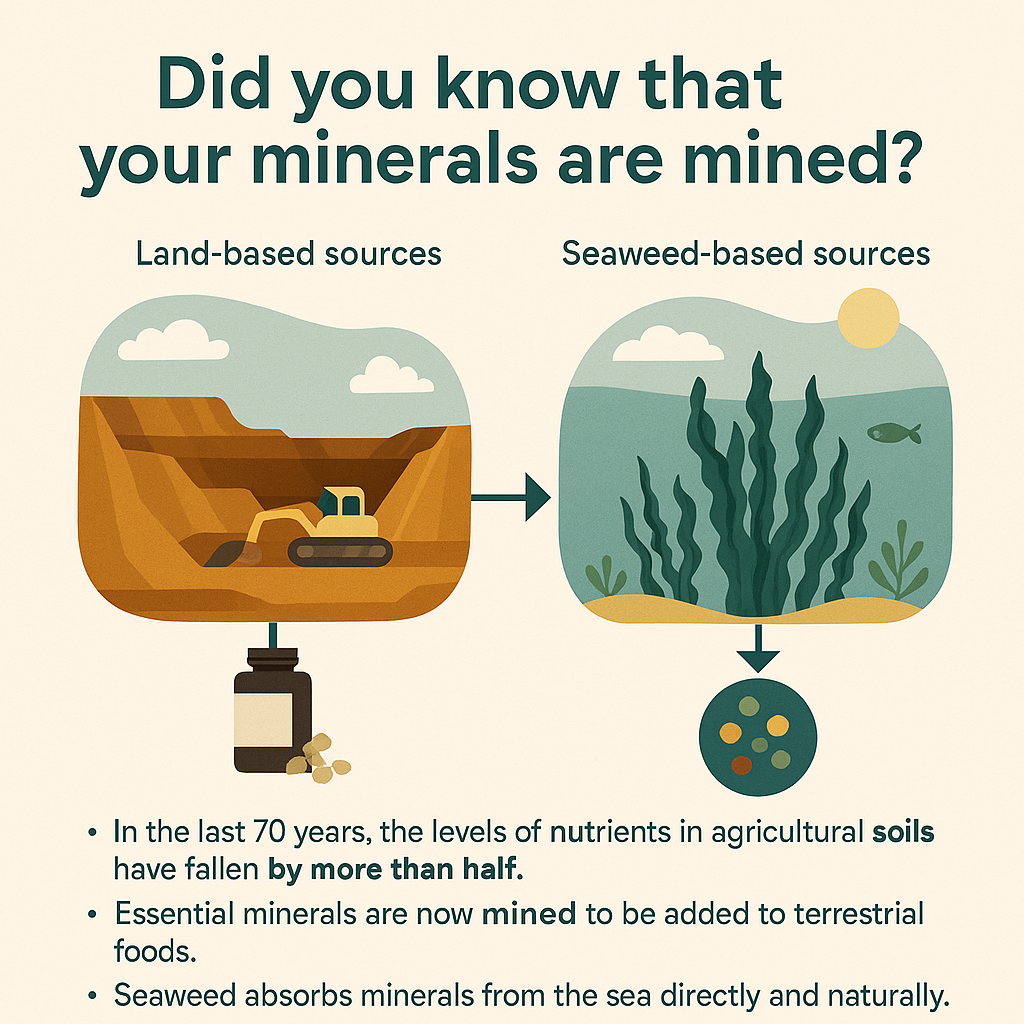As we celebrate the release of Sir David Attenborough’s Ocean with David Attenborough, highlighting the oceans' pivotal role in our planet's future, it's timely to reflect on how the sea can also revolutionize our approach to nutrition.
When you think of essential minerals like iron, magnesium, iodine, selenium, or zinc, do you imagine a lush green farm? Or perhaps a fresh salad?
What most people don’t realize is that many of the minerals in modern supplements and fortified foods don’t come from plants at all—they’re mined.
That’s right. Due to widespread soil mineral depletion, we now extract key nutrients from rocks, not roots. Here's why that matters—and why seaweed might just be nature’s smarter solution.
⚒️ The Hidden Cost of Mined Minerals
Resource Depletion: Over the last 70 years, nutrient levels in agricultural soils have dropped by more than 50%, leading to increased reliance on mined minerals for supplementation.
Market Value: The global mineral supplements market is projected to reach USD 31.20 billion by 2034, up from USD 17.53 billion in 2024, growing at a CAGR of 5.93% .
Many essential minerals in our diets—such as iron, magnesium, iodine, selenium, and zinc—are traditionally sourced through mining. This process is not only energy-intensive, and deeply embedded in fossil fuel-intensive industries, but also contribute significantly to environmental degradation like water and soil pollution.
For instance:
-
Iron: Predominantly extracted from hematite and magnetite ores, iron mining is a major contributor to habitat destruction and carbon emissions.
-
Magnesium: Often obtained from dolomite rock or evaporated seawater, its extraction involves energy-intensive processes like electrolysis.
-
Selenium: Typically a byproduct of copper mining, selenium extraction is costly and concentrated in specific regions.
-
Iodine: Sourced from brine pools or oil and gas field effluents, its extraction is intertwined with fossil fuel industries.
-
Zinc: Mined extensively, leading to toxic tailings and environmental hazards.
🌊 Seaweed: Nature’s Renewable Mineral Source
Unlike mined minerals, seaweed absorbs essential trace elements directly from the ocean—no blasting, no chemicals, no carbon-intensive processing.
At PhycoHealth, we cultivate green seaweed in filtered seawater enriched with recycled nutrients. Our seaweed naturally concentrates iron, iodine, magnesium, and more—offering a wholefood matrix of minerals in a bioavailable, regenerative, and zero-waste form.
Each time you choose a PhycoHealth product made with our seaweed, you’re not only nourishing your body—you’re skipping the mine and healing the ocean.
💡 The Health Implications
-
Iron Deficiency: Iron deficiency is the most common inadequate nutrient worldwide, affecting approximately 2 billion people. Globally, anemia affects 1.6 billion people, representing a public health emergency in mothers and children under five.
 Pandey S, Singh V. Food Fortification to Combat Iron Deficiency Anaemia. International Journal of Advanced Nutritional and Health Science 2013;1(1): 39-47
Pandey S, Singh V. Food Fortification to Combat Iron Deficiency Anaemia. International Journal of Advanced Nutritional and Health Science 2013;1(1): 39-47 -
Iodine deficiency: affects 1.88 billion people globally, and is the leading casue of preventable brain damage globally, particularly in developing countries .
🌿 From seabed to skin and spoon, we think it’s time to grow your minerals—not dig for them.
